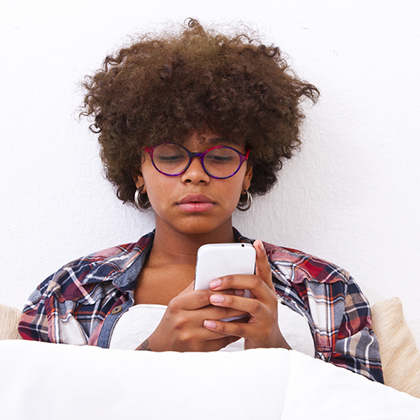
Image Source: Shutterstock
Remember when social media was a new thing? Or more importantly, when it used to be fun?
I’m talking about the days before mama, grandma, and your aunties and ‘nem joined and started judging your every comment, picture, and relationship status update.
In the early days of MySpace and Facebook, you would gather up your pictures on a scanner (terrible quality by the way) to share with your bunch of friends (or the thousands of strangers you decided to let into your world), excited to interact with people you met at college events and orientations, or just through the world wide web. It was all so simple.
But I should have known that things were going to go downhill when they introduced the “Note” option on Facebook. Out of nowhere, you were being tagged in long messages from ex-boyfriends, stressed friends and the like, where absolutely too much information would be shared. Don’t even get me started on the “As this year comes to a close” notes.
And then, as big events rolled around, whether it be holidays or presidential elections, you started seeing a different side of the “friends” you pretended you knew. Irritated by their rants about your favorite candidate, tired of their gripes with small, harmless things, inundated with subliminal attacks on significant others, former friends, and “haters,” hell, even beefs with the Christmas holiday, it was as if people started to have too much to say and share. Nothing was the same.
At this point, you log into Facebook and other social media pages and find yourself bombarded with all kinds of things that don’t really enlighten or enrich your day to day. Instead, they get on your absolute last nerve. And according to research, these messages and Debbie Downer people can actually leave you depressed.
In a study done by the University of Pittsburgh in March, 1,787 American adults were asked to share how much time they spent on social media, and they had their risk of depression assessed through a questionnaire. What researchers found was that, on average, people spent about 61 minutes on at least one platform during the day. The more time spent on it, the greater the risk of feeling depressed. As Cosmo pointed out from the study:
What you’re exposed to when you dive into your social accounts is also a huge player in how positively or negatively they affect you. Consider signing on to a feed filled with angry political rants, updates on breaking tragic news items, and hundreds of posts about people struggling with, say, debilitating illnesses or interpersonal turmoil. Compare this to perusing a newsfeed peppered with adorable animal photos, funny quips, and inspiring quotes. Chances are, the latter would be more likely to make you smile while the former would make you feel anxious, aggravated, or sad — no matter how strong your self-image is.
I wouldn’t say that I was left feeling down in the dumps by the actions and statements of the people I followed, but I definitely found that my mood would morph when I would come across certain negativity. Irritated by bait set to cause trolls to attack people comfortable in their skin (from women without makeup to plus-size girls and even EJ Johnson), over the shots of people sending the most mindless and offensive memes around with the caption “#facts,” and exhausted by the pointless, self-absorbed images people would post back to back to back in a day, I thought that I just needed another sabbatical from social media–my second in a year. But as my friend pointed out, I just needed to do some cleaning.
“Unfollow them,” she said.
Could it all be so simple again? In the back of my head I always imagined that such a move would create drama. In college, if you unfollowed an individual, say, on Facebook, they would notice. We were so thirsty to have a gang of “friends” that looking and seeing a decrease in just one would leave people feeling some type of way. But as she pointed out, “You have to filter out the negativity. Just follow people and things that bring you a sense of peace. There’s so much foolishness out there.”
And so I did. I clicked and clicked and clicked unfollow until I was left with the people I actually knew from school, media work, and my old neighborhood. That and fitness enthusiasts to keep me inspired. No more looking at friends of friends I had never spoken to, mean-spirited pages, or just flat-out ugliness. It has made surfing social media to be inspired, uplifted and enlightened so much easier…and dare I say, fun.
And I think that’s what more of us need to do for our mental stability and in our search for positivity. Some of us often feel trapped staring at feeds filled with foolishness and videos with the most ridiculous behavior to the point where we feel drained after scrolling through after a few minutes, but continue staring at the shenanigans anyway. And considering that we spend so much of our day on social media (at least an hour based on the aforementioned study), we need to do a more thorough job, for ourselves, of being better gatekeepers to the things that infiltrate our psyche and our spirit.
Social media is a big part of the way we communicate, get our news, and just stay connected to the world around us. Considering that it is something that will likely expand and be around until the next great tech development surfaces, for the sake of your sanity, know what to invite in, and what to block (or unfollow) out.









